Rishi Sunak: India glee over new British PM
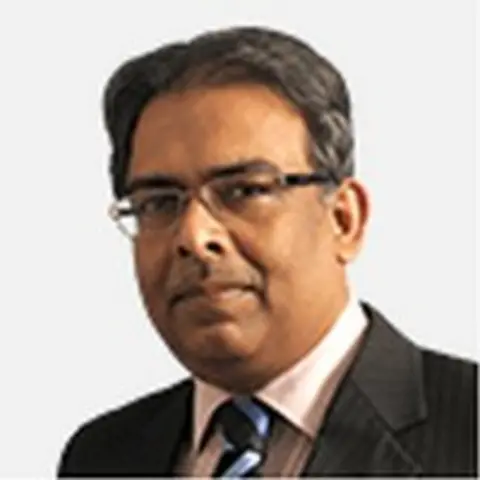
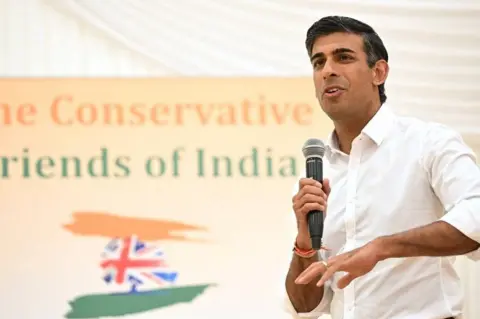 Reuters
ReutersThe headlines in India about Rishi Sunak say it all.
The elevation of the 42-year-old Indian-origin Tory leader - his parents migrated from East Africa to the UK - as the third British prime minister this year appears to have gladdened the hearts of many Indians. Even the sceptics cannot help but feel a tad triumphant.
Of course it's the nationalists who are most elated and appear keen on claiming Mr Sunak through his faith.
Rishi Sunak, a "proud Hindu" is the new UK PM, writes India's biggest English daily, Times of India - the story mentions the word Hindu five times. Being Hindu in 10 Downing Street, chimes in India Today, adding that Mr Sunak "got the top job in UK despite being Hindu, not because of it".
Others use colonial references: "Sunak: Ex-India Company set to run Britain,"said The Telegraph, alluding to the firm that controlled large parts of India with its mercenary forces. Dainik Bhaskar, a Hindi-language newspaper, ran the headline: "Another Diwali gift to the nation, Indian-origin Rishi to rule the whites".
In the eyes of many Indians, Mr Sunak's new job is rich in symbolism: they appear to be convinced that the new prime minister will be good for India.
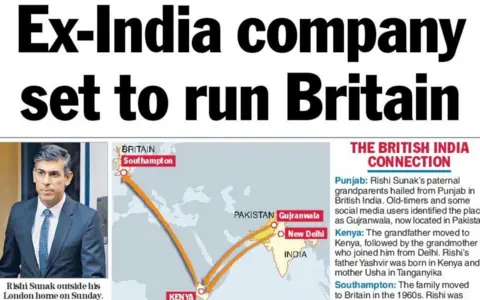 The Telegraph newspaper
The Telegraph newspaper In August, Mr Sunak opened a campaign event comprising a largely British Indian gathering in north London with traditional greetings. He also broke into Hindi, and said he would work to boost ties with India if he became the prime minister.
Mr Sunak swore his oath as an MP on the Bhagvad Gita, a revered Hindu text. He worshipped a cow during a recent ritual, lit Diwali lamps at his Downing Street residence and says he loves cricket, a veritable religion in India.
His father-in-law is a software billionaire and the founder of Infosys, a giant outsourcing firm which is the pride of India. In a letter to his daughter, NR Narayana Murthy found Mr Sunak, then her fiancé, "to be all that you had described him to be - brilliant, handsome and, most importantly, honest".
When Mr Sunak was poised to become the prime minister earlier this year, there was some social media ribbing about it in India, with some finding the celebrations over it a bit risible.
But other Indians like Kancha Ilaiah Shepherd, an academic and writer, saw Sunak's elevation as pointing to a "notable new level of multicultural tolerance among the British electorate and the political class".
Indians have always been fascinated by the career trajectories of the diaspora, says Salil Tripathi, a New York-based Indian author.
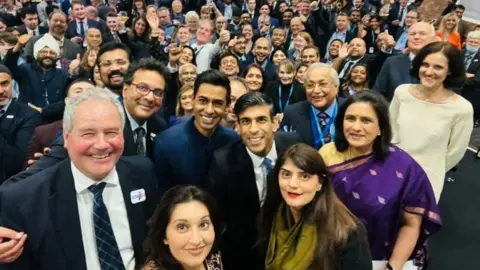 CFINDIA
CFINDIA"They take a look of pride when a Sundar Pichai runs Google, or Satya Nadella runs Microsoft. These successes overseas are seen as vindication of Indian excellence. The fact that these individuals succeeded in an alien environment is a matter of particular pride," Mr Tripathi says.
What usually goes missing is a conversation about class. Mr Sunak was educated at an elite school and went to Oxford and Stanford. Likewise, Mr Tripathi adds, Indian corporate achievers are mostly products of elite Indian universities.
As most Conservative Party politicians of Indian origin represent seats that are Tory strongholds, Mr Tripathi adds, "to that extent they have limited appeal among Indian or broader Asian communities".
"Mr Sunak's achievement is arguably more important because he has become prime minister of a country with its own messy colonial past, and a society that continues to deal with racism."
At the diaspora campaign event in August Mr Sunak spoke about the need to look at the India-UK relationship "differently because there is an enormous amount that we here in the UK can learn from India".
"Rishi will be a great PM for the nation and to work with India, especially at this time when Britain and India are working on launching the Free Trade Agreement (FTA). He has tremendous experience and demonstrated his skills during the Covid pandemic saving British jobs and businesses as chancellor," says Nayaz Qazi, director of Conservative Friends of India.
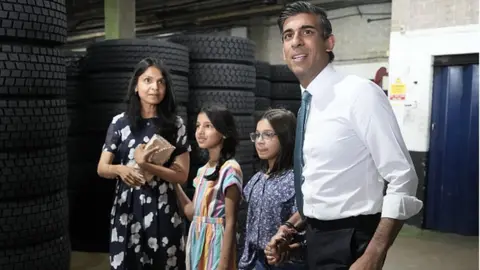 EPA
EPAWhen it comes to India, Mr Sunak's main job will be to revive the stalled "high ambition" FTA - the two sides launched negotiations in January. India expects to increase exports of leather, jewellery, textiles and food products and secure more visas for students and businesses.
The ambitious pact - which aims at doubling bilateral trade to $100bn by 2030 - appears to have run into heavy weather after Indian-origin home secretary Suella Braverman told Spectator magazine that it would increase Indian migration to UK at a time when "the largest group of people who overstay are Indian migrants". Mr Sunak has said he was strongly committed to the deal with India, which has edged out Britain to become the world's fifth-largest economy.
India-UK relations will strengthen under the new prime minister, Happymon Jacob of Jawaharlal University in Delhi believes, "not because Mr Sunak has Indian origins, but because his premiership is likely to deliver on two things": the FTA; and "going by Mr Sunak's campaign rhetoric against China, the UK will be less ambiguous about its view of China as a threat".
"Delhi is looking to close the FTA, and would be delighted to see Western powers, particularly the UK, taking on the Chinese," Mr Jacob says.
Others are not so sure. "India will not be on top of Mr Sunak's agenda," says Sanjaya Baru, a Delhi-based policy analyst. "There are economic challenges to be dealt with at home and restoration of external stability with the European Union and the US. So India will not be his number one priority. We will have to be patient."
Mr Baru notes that more than 200 persons of Indian origin have been elected to positions of political power in 25 countries, with 10 governments being headed by a person of Indian origin. When Leo Varadkar becomes the prime minister of Ireland, both the UK and Ireland will have Indian-origin leaders.
"Many of them have been trouble-free friends of India, but some have made Indian diplomats work hard," he says.
Mr Tripathi is more circumspect. Mr Sunak, he says, "will want a free trade agreement with India but it won't be at the cost of significantly changing Britain's immigration policy."
"Mr Sunak will place British interests first, and hence the mood will sour."
